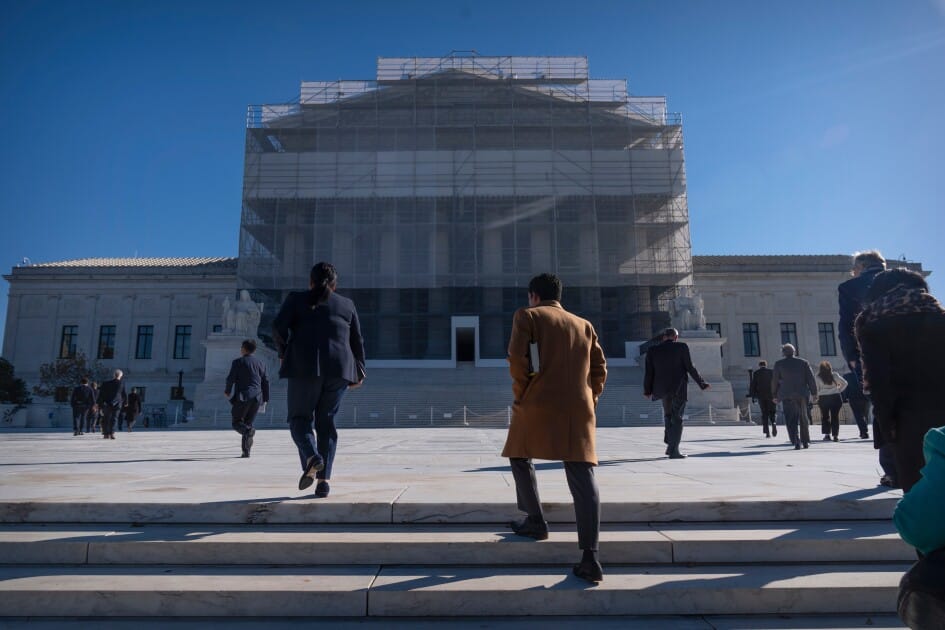A majority of U.S. Supreme Court justices voiced skepticism on Wednesday about the legality of President Donald Trump’s sweeping tariffs, which are being challenged by two educational toy companies and others who say the measures will raise costs for school districts.
During more than two hours of arguments in Learning Resources Inc. v. Trump, Chief Justice John G. Roberts Jr. said the tariffs were an “imposition of taxes on Americans, and that has always been the core power of Congress.”
Justice Neil M. Gorsuch warned of “a one-way ratchet toward the gradual but continual accretion of power in the executive branch and away from the people’s elected representatives” in Congress.
Justice Amy Coney Barrett asked tough questions of both sides, while more liberal members Sonia Sotomayor, Elena Kagan, and Ketanji Brown Jackson also appeared sympathetic to the challengers.
The lead challengers to Trump’s tariffs are Learning Resources Inc. and hand2mind Inc., both based in Vernon Hills, Ill., a Chicago suburb. They sell hands-on learning toys focused on STEM learning, computer coding, social emotional learning, reading, and mathematics.
Most of their products were manufactured in China until the president imposed some of his highest tariffs on that country. The companies have shifted some of their production to Vietnam and India, although those countries have also seen higher Trump tariffs.
“Mr. Trump … raised the tax rate on our company to the point it was asphyxiating,” Rick Woldenberg, the CEO of both education companies, told Education Week recently. Woldenberg and several of his adult children who work for the companies were in attendance at court.
Trump has increased baseline and nation-specific tariffs on imported goods based on two conditions he has declared “emergencies.”
One involves the flow of fentanyl and other lethal opioids into the United States from countries such as Canada, Mexico, and China. Portions of the increased tariffs on those nations are meant to pressure them to better combat the problem.
The other emergency cited by the president is the existence of longstanding trade imbalances between the United States and many of its trading partners.
“President Trump has declared that these emergencies are country-killing and not sustainable, that they threaten the bedrock of our national and economic security, and that fixing them will make America strong, financially viable, and a respected country again,” U.S. Solicitor General D. John Sauer told the justices during the Nov. 5 arguments.
Argument at times a civics lesson
Woldenberg and other challengers argue that Trump’s use of a 1977 federal law, the International Emergency Economic Powers Act (IEEPA), exceeds his powers because the statute does not mention tariffs.
“Tariffs are taxes,” Neal K. Katyal, a Washington lawyer representing small-business owners challenging the tariff policies. “They take money from Americans’ pockets and deposit them in the U.S. Treasury. Our founders gave that taxing power to Congress alone. Yet, here, the president bypassed Congress and imposed one of the largest tax increases in our lifetimes.”
Katyal and a lawyer representing a group of 12 states, also challenging the tariffs, faced pushback from conservative Justices Clarence Thomas, Samuel A. Alito Jr., and Brett M. Kavanaugh.
“I know you dispute the fact that this is a real emergency,” Alito told Katyal. “Maybe it’s not. But isn’t it the very nature of an emergency provision that it’s going to be more open-ended?”
Kavanaugh expressed concern that restricting the president’s ability to impose tariffs would take away from his “suite of tools” to deal with economic emergencies.
At times, though, the argument sounded like a civics lesson dealing with the underpinnings of the American Revolution and the constitutional separation of powers.
“Tariffs are constitutionally special because our founders feared revenue-raising measures, unlike embargoes on foreign countries’ exports,” Katyal said.
“You know, there was no Boston embargo party, but there was certainly a Boston Tea Party,” he said.
Gorsuch said the key context here was “the constitutional assignment of the taxing power to Congress, the power to reach into the pockets of the American people is just different, and it’s been different since the founding.”
A decision in the case is expected by next June.
2025-11-05 21:29:40
Source link

